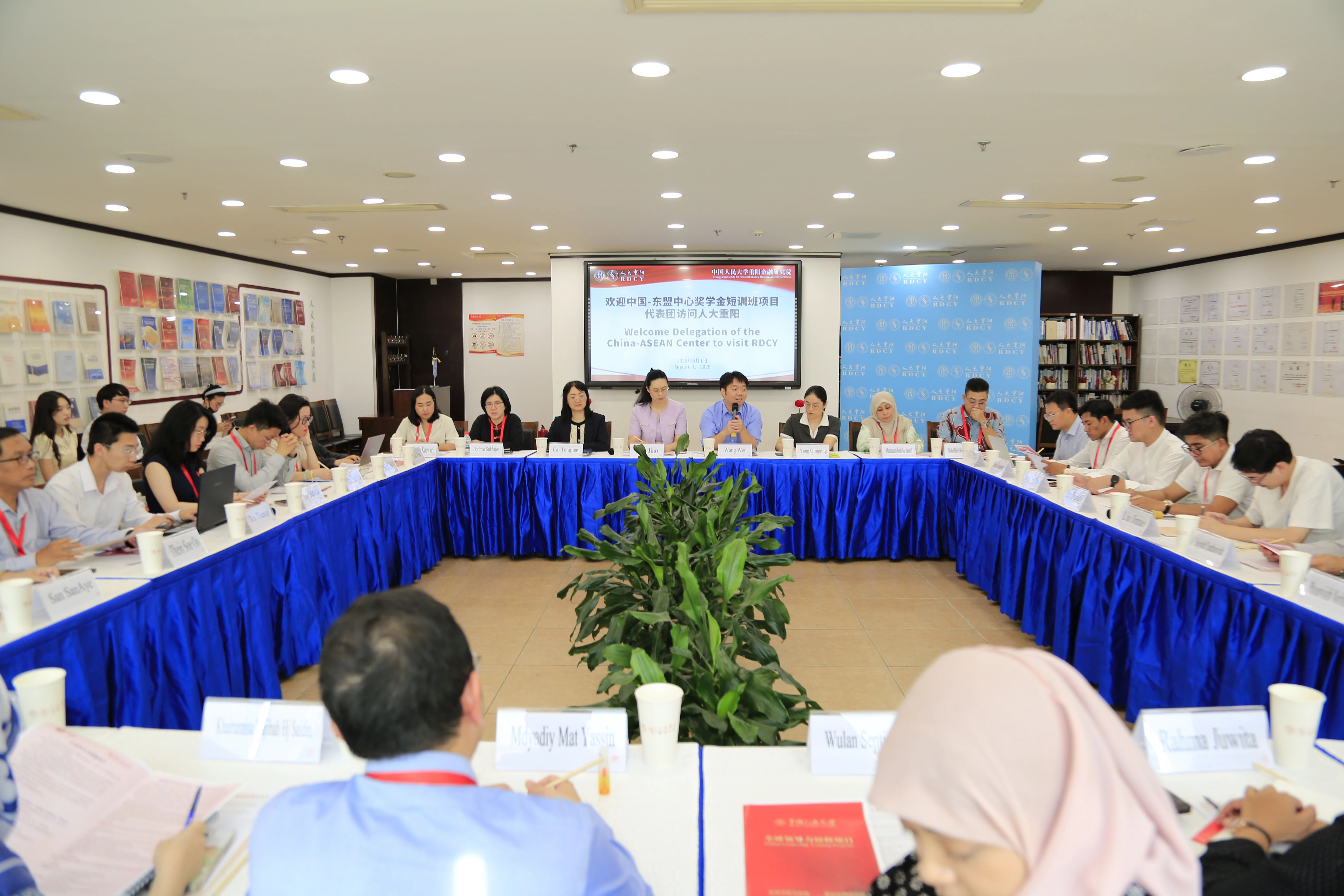EVENTS
Your Present Location: EVENTSDelegation of the China–ASEAN Center Visits RDCY
Delegation of the China–ASEAN Center Visits RDCY
On August 1, 2025, a delegation of 22 senior officials from nine ASEAN member states, including Vietnam, Cambodia, Laos, Myanmar, Indonesia, Malaysia, Thailand, Brunei, and the Philippines, visited the Chongyang Institute for Financial Studies at Renmin University of China (RDCY), organized by the China–ASEAN Centre, visited the Chongyang Institute for Financial Studies at Renmin University of China (RDCY) for in-depth discussions on key topics including China’s economic development, China–ASEAN relations, the Belt and Road Initiative, and China–U.S. trade frictions.

The delegation included representatives from key government agencies such as the Ministry of Higher Education of Malaysia, the Public Service Department of the Prime Minister’s Department of Malaysia, the Department of Trade and Industry of the Philippines, the Ministry of Culture, Youth and Sports of Brunei, the Ministry of Commerce of Thailand, the Ministry of Education of Myanmar, as well as the foreign ministries of Indonesia, Cambodia, Vietnam, and Laos.
Professor Wang Wen, Dean of RDCY and Dean of the School of Global Leadership at Renmin University of China, extended a warm welcome to the ASEAN delegation. In his keynote remarks themed “Compound Interest of a Major Power”, Professor Wang responded to the questions raised by the ASEAN officials. He emphasized that China’s development over the past half century has been characterized by steady returns, long-term accumulation, and sustainable growth. He elaborated on five new pillars of China’s high-quality development: new well-being, new consumption, new manufacturing, new infrastructure, and new services, as well as six critical reform battles against poverty, isolation, pollution, corruption, hegemony, and crises. Looking ahead to China’s development prospects in 2029 and 2035, Professor Wang argued that China’s trajectory will inject fresh momentum into the prosperity of ASEAN countries.
During the discussion session, RDCY researchers responded to questions on topics such as China–ASEAN cooperation under the Belt and Road Initiative, China’s experience in addressing U.S. tariffs, as well as the Regional Comprehensive Economic Partnership (RCEP) and the China–ASEAN Free Trade Area 3.0.
Research Fellow Liu Ying highlighted that China–ASEAN trade has exceeded one trillion U.S. dollars, with cumulative two-way investment reaching 400 billion U.S. dollars, and stressed that both “hard” and “soft” connectivity are making the region a hub of global supply chains. Research Fellow Dun Zhigang underscored China’s emphasis on shared soft power, supporting multilateralism and reform of the United Nations. Associate Research Fellow Xu Tianqi summarized China’s three approaches in dealing with U.S. tariffs: preparing contingency plans in advance, strengthening domestic resilience, and building a diverse set of international partners beyond the U.S. Yang Qingqing, Deputy Dean of RDCY, along with colleagues from the RDCY research department, welcomed the delegation for the meeting and discussion.
At the conclusion of the visit, delegation members noted that their “takeaways exceeded expectations.” Many participants remarked that RDCY’s open atmosphere and pragmatic research had given them a more direct and multidimensional understanding of China’s path to modernization, and had strengthened their confidence and motivation to deepen future cooperation between China and ASEAN in areas such as the digital economy, green development, and public governance.
Since its founding, RDCY has been committed to promoting cultural exchanges and international engagement, fostering dialogue and mutual learning between China and think tanks in more than 100 countries.
In recent years, RDCY has frequently hosted international delegations. In 2025 alone, under the guidance of the university’s Party Committee and with support from ministries, embassies, and partner institutions, RDCY hosted delegations such as the U.S. Embassy in Beijing, the UK Foreign, Commonwealth & Development Office, the Ministry of Foreign Affairs of Uzbekistan, the Ministry of Defence of Singapore, and the Vice Foreign Minister of Iran. It also welcomed academic groups including the youth leadership delegation of Hungary’s Matthias Corvinus Collegium, a research delegation of scholars from 11 BRI partner countries, the Center for Political Economy of Argentina, and Johns Hopkins SAIS, as well as business delegations from Vale (Brazil), the Russia–China Chamber of Commerce, and the Malaysia Association of Professional Skills Development, among many others.
RDCY will continue to advance China’s exchanges and cooperation with countries around the world, contributing its expertise and insights to China’s diplomacy and international think tank dialogue.























































































 京公网安备 11010802037854号
京公网安备 11010802037854号





